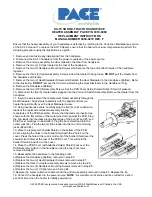
Safety
only identical National replacement parts.
24. STORE IDLE EQUIPMENT: When not in use, store in a dry, secured place. Keep away from children.
25. MAINTAIN LABELS AND NAMEPLATES: These carry important information. If unreadable or missing, contact National for a replace-
ment.
26. MACHINE IS HEAVY, DO NOT DROP. Ensure proper lifting procedures are followed when transporting.
27. WHEN OPERATING MACHINE, tether cord must be connected to operator.
28. DO NOT ALLOW the oscilating plates to come into contact with the supply cord.
29. REGULARLY EXAMINE the supply cord for damage, such as cracking or aging. If damaged, replace the cord before further use. Only
replace the supply cord with the type specifi ed in this manual.
CHARACTERISTICS OF A DEFENSIVE OPERATOR
A Good Operator is a “Defensive” Operator!
QUALITIES INCLUDE:
Education: Educates themself on the machine and the environment.
Alert: Stays alert at all time and never lets guard down.
Skills: Only performs duties he/she is qualifi ed to do. Always tries to improve.
Judgment: Use sound judgement. Does not take uncessary risks.
Common Sense: Applies knowledge in practical situations.
Recognizes the Hazards: Maintains alertness. Anticipates danger.
Understands the Defense: Knows that safety isn’t an accident…it’s a thinking person’s choice.
Acts Correctly: Does not give in to peer pressure. Performs correctly when supervised or not.
HYDRAULIC SAFETY TIPS
MAINTAINING A SAFE WORK ENVIRONMENT
Establishing a safe working environment in and around your hydraulic equipment is just common sense. The easiest and most effective way to
avoid problems is to make sure associates understand their equipment, know how to operate it safely and recognize the danger it represents if
handled carelessly. A few things you must be aware of include:
1. PRESSURE:
Hydraulic fl uid under pressure is dangerous and can cause serious injury.
2. FLAMMABILITY:
When ignited, some hydraulic fl uids can explode and/or cause fi res.
3. MECHANICAL:
Hydraulic fl uid creates movement, which causes parts of your equipment to move or rotate. Always be aware of what
you are doing.
4. MOISTURE:
Use caution when operating in wet or high moisture conditions. Make sure all electrical fi ttings, switches, cords plus stain
reliefs are in good condition. Always unplug when not in use and when doing any service work.
5. ELECTRICAL:
Faulty wiring can also be an electrical hazard. A regular preventive maintenance program should always include a wir-
ing check. Unplug batteries and/or charger before serving.
6. TEMPERATURE
: Because this machine operates at a relatively low pressure, overheating is not common. If surface of tank becomes
too hot to touch by hand (above 130º F, 55° C), shut off machine and allow to cool off.
PRESSURE
Our system runs at or below 2,000 psi. Never look for a leak when unit is under pressure. Using your hand could cause serious injury. A few
common ways to encounter hydraulic fl uid under pressure include:
1. PINHOLE:
Fluid under pressure can cause serious injury. It can be almost invisible escaping from a pinhole, and it can pierce the skin
into the body. Do not touch a pressurized hydraulic hose assembly with any part of your body. If fl uid punctures the skin, even if no pain is
felt, a serious emergency exists. Obtain medical assistance immediately. Failure to do so can result in loss of the injured part or death.
2. LEAK:
Keep fi ttings and hoses tight. Only check and service when not under pressure. Leaking hydraulic fl uid is not only unsightly, it’s
hazardous. In addition to making workplace fl oors slippery and dangerous, leaks also contaminate the environment. Before cleaning an oil
Fax: 763-535-8255
6







































